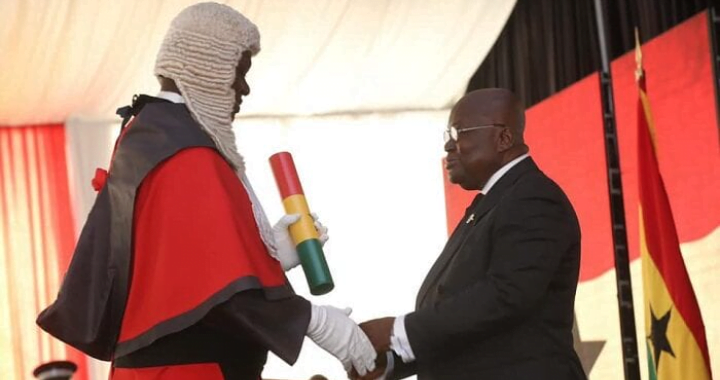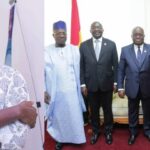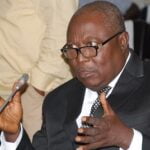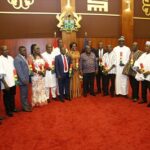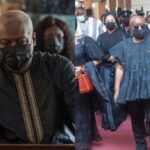The president, Nana Addo Dankwa Akufo-Addo following a petition by pressure group, Alliance for Social Equity and Public Accountability(ASEPA) demanding the removal of the Chief Justice has set in motion processes to determine whether or not Chief Justice, Kwasi Anin-Yeboah should be removed from office.
The petition is over the alleged role of the Chief Justice in the $5 million bribery allegation. The Chief Justice has earlier asked the Police to conduct investigations into the bribery allegation leveled against him and has directed that a petition be lodged with the Disciplinary Committee of the General Legal Council in respect of the allegations.
Despite these actions by the Chief Justice, ASEPA contends that the allegations have brought the name of the Judiciary into disrepute and cast a serious slur on justice administration in the country, hence the presidential petition.
In a letter signed by Nana Bediatuo Asante, Secretary to the President in response to the ASEPA petition, the President had, by Article 146 (6) of the Constitution began the process to determine whether or not Chief justice, Kwasi Anin-Yeboah should be removed from office.
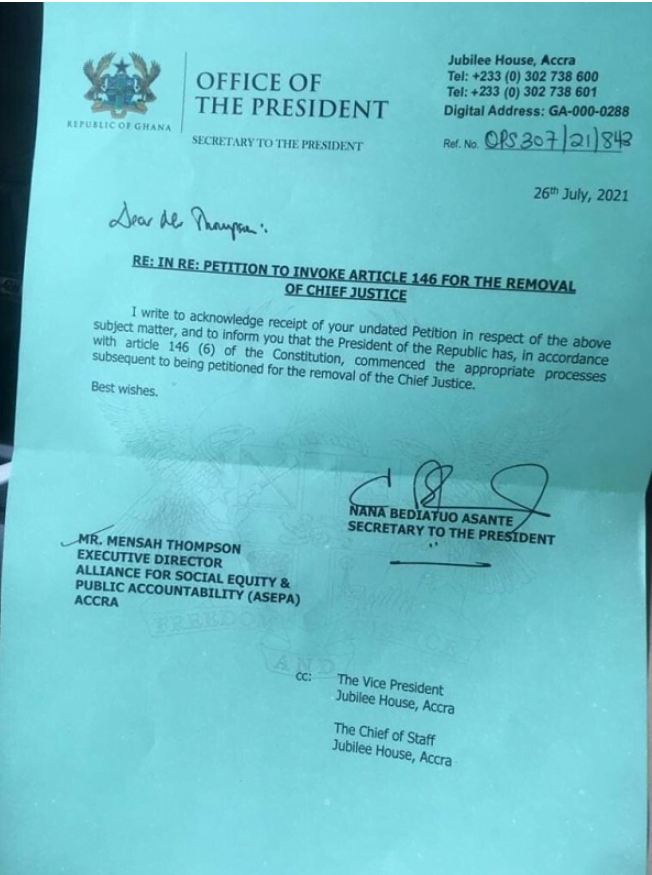
The Group has also filed a petition to the Commission on Human Rights and Administrative Justice to investigate the matter.
The Allegation by Mr. Akwasi Afrifa, a lawyer, in a response to a petition filed against him by his client, Nana Ogyeedom Obranu Kwesi Atta IV, alleged that his client told him the CJ had demanded a USD 5 million bribes to purportedly influence his case before the Supreme Court.
The case involves Ogyeedom Obranu Kwesi Atta IV versus the Ghana Telecommunications Company and Lands Commission.
Nana Kwesi Atta has also denied making the allegation against the Chief Justice.
The allegation arose from the case titled Ogyeedom Obranu Kwesi Atta VI vs Ghana Telecommunication Co. Ltd. (now Vodafone Ghana Limited) and the Lands Commission.
It started at the Swedru High Court, went to the Court of Appeal, Cape Coast, now pending in the Supreme Court.
The facts are that Ogyeedom Obranu Kwesi Atta VI, has a $16 million judgment against Ghana Telecommunication Co. Ltd. (now Vodafone Ghana Ltd.), from the High Court, Swedru. This followed an admission by Lands Commission at the Swedru High Court that it had granted the disputed land to Vodaphone Ghana Limited mistakenly, thinking it was state land duly acquired by Executive Instrument and compensation paid to Ogyeedom’s predecessor in title.
Vodaphone appealed the judgment to the Court of Appeal, but their appeal was dismissed and the Company (Vodafone) was ordered by the Court to make a payment of $4 million as part payment of the judgment debt pending the outcome of its appeal.
Vodafone filed an appeal to the Supreme Court following its dissatisfaction with the outcome in the Court of Appeal.
Pending the appeal at the Supreme Court, Vodafone discovered documents, including signed receipts from the archives, indicating that the land had been duly acquired under Executive Instrument No. 86 (E.I. 86) and compensation fully paid in 1969 by the government of Ghana for the acquisition of the land to one Nana Obranu Gura II, Ogyeedom’s predecessor in title.
Vodafone then applied for leave to adduce the fresh evidence in the Supreme Court to support its appeal.
The Company also filed an application before the Supreme Court for a stay of the execution of the remainder of the judgment pending the determination of its appeal.
Following the two applications, the President of the panel of five justices of the Supreme Court, before whom, the application for stay of execution of the payment of the rest of the judgment debt to Ogyeedom was placed, wrote a formal memo to the Chief Justice for the enhancement of the panel.
The Chief Justice then presided over an enhanced panel of seven justices who went on to grant an order for the stay of execution of Ogyeedom’s entire judgment.
The panel also made a consequential order that Ogyeedom should refund into court, the part payment of the judgment debt of $4 million that he had already received from Vodafone.
The application for the adduction of fresh evidence was also granted in favor of Vodafone by the Court, composed differently but still presided over by the Chief Justice.
Ogyeedom also then brought an application before the Supreme Court, asking for leave to lead fresh evidence to contradict the new evidence that Vodafone had been granted leave to adduce to demonstrate that the signatures of Nana Obranu Gura II, his predecessor in title, on the compensation receipts had been forged.
By a majority of Four to One, the Court granted the application in favor of Ogyeedom, with the Chief Justice being the only one dissenting, insisting that it was wrong to allow Ogyeedom to remake his case.

